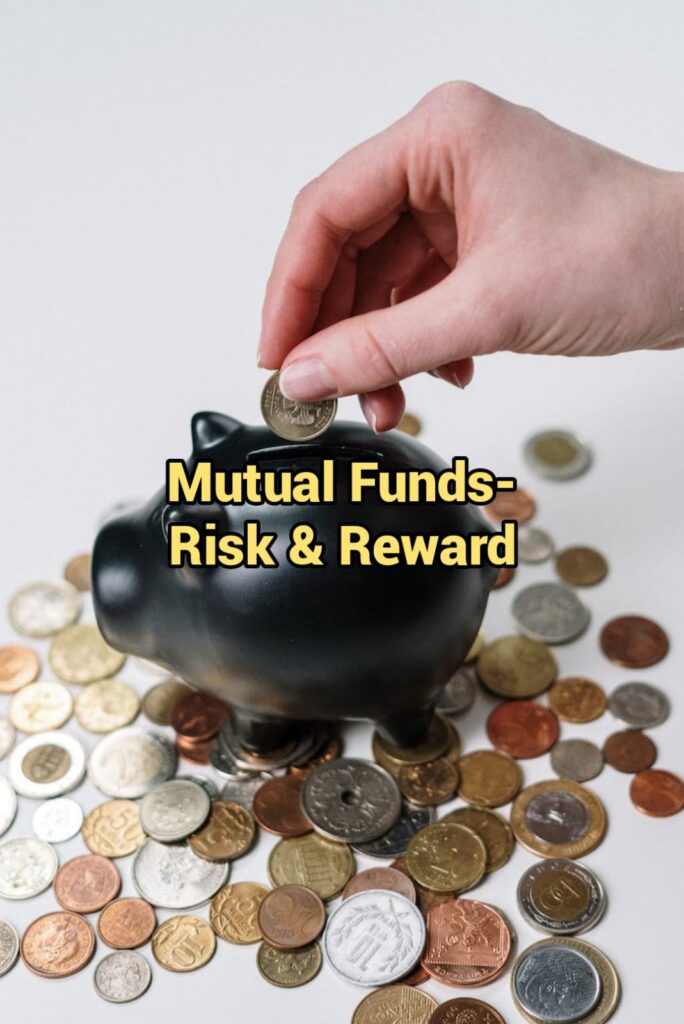Investing in mutual funds can be both a risky and rewarding venture. With mutual funds, you have the potential to earn high returns but also face the risk of losing money. This article will guide you through the basics of mutual funds, what risks and rewards are involved, and how to choose the right one for you.
What are Mutual Funds?
Mutual funds are investment vehicles that pool money from many investors and invest it in a diversified portfolio of securities, such as stocks, bonds, and short-term debt. The fund’s manager selects the mix of assets in the portfolio and oversees the day-to-day operations of the fund.
Investors in mutual funds benefit from professional management, diversification, and economies of scale. Mutual funds are also subject to market risk, which is the risk that the value of the securities in the fund’s portfolio will decline.
When choosing a mutual fund, investors should consider factors such as expense ratio, performance history, and investment objectives.
How Do You Know if a Mutual Fund is Right For You?
Before investing in a mutual fund, it’s important to understand what they are and how they work. A mutual fund is an investment vehicle that pools money from many investors and invests it in a portfolio of securities, such as stocks, bonds, or short-term investments. The purpose of a mutual fund is to provide investors with a way to diversify their investments and receive professional management.
There are many different types of mutual funds available, each with its own objectives and strategies. It’s important to align your investment goals with the right type of mutual fund. For example, if you’re saving for retirement, you may want to invest in a target date fund which automatically rebalances itself as you get closer to retirement age.
Here are some questions to ask yourself before investing in a mutual fund:
- What are my investment goals?
- What is my time horizon for meeting these goals?
- How much risk am I willing to take?
- What types of securities does the mutual fund invest in?
- Does the mutual fund have any performance fees?
- What are the expenses associated with the mutual fund?
- Which mutual funds should I invest?
Types of Mutual Funds and the Risks Involved with Each Type
There are three types of mutual funds: equity, debt, and balanced. Each type has its own risks and rewards.
Equity funds are the most risky, but also have the potential for the highest returns. They invest in stocks, which can go up or down in value.
Debt funds are less risky than equity funds, but have lower returns. They invest in bonds, which are loans that companies and governments make to each other.
Balanced funds are a mix of equity and debt funds. They aim to provide moderate risk and moderate returns.
The risks involved with each type of mutual fund depend on what the fund invests in.
Equity funds that invest in small companies or volatile industries tend to be riskier than those that invest in large companies or stable industries.
Debt funds that invest in high-yield or junk bonds tend to be riskier than those that invest in investment-grade bonds.
Balanced funds that have a higher percentage of their assets in equities tend to be riskier than those with a lower percentage of assets in equities.
No matter what type of mutual fund you invest in, there is always the risk that you could lose some or all of your money. It is important to research a fund and understand its risks before investing.
Mutual Fund Companies
There are many different mutual fund companies out there, each with their own unique investment strategies and goals. It can be difficult to know which one is right for you, but it is important to do your research before investing. Each company has different fees, risks, and rewards associated with their funds. Some companies may be more volatile than others, while some may have higher fees. It is important to understand what you are looking for in a mutual fund before choosing a company.
When looking at mutual fund companies, you want to consider the following:
1) Investment Strategy – What is the company’s investment strategy? Do they invest in stocks, bonds, or both? What types of securities do they hold? What is their philosophy on risk and return?
2) Portfolio Performance – How has the company’s portfolio performed in the past? You can look at historical data to see how well the fund has done in different market conditions.
3) Fees – All mutual fund companies charge fees, but some charge more than others. Make sure you understand all the fees associated with investing in a particular fund before making your decision.
4) Reputation – What is the company’s reputation? Are they well-respected by investors? Do they have a good track record?
5) Customer Service – If you have any questions or concerns, how easy is it to get in touch with customer service? Are they helpful and responsive?
6) Financial Strength – How strong is the company’s financials? Do they have enough capital to cover their liabilities? Are they well-diversified with investments?
By researching each mutual fund company thoroughly, you can make an informed decision and find the right fit for your investing needs.
What to Watch Out for When Buying Mutual Funds.

When buying mutual funds, it is important to watch out for fees, risks, and historical performance.
Fees: Make sure to check the fees associated with the fund before investing. Some fees can include an annual fee, a front-end load fee, or a back-end load fee.
Risks: All investments come with some degree of risk. With mutual funds, there is the potential for loss of principal. Be sure to research the risks associated with the specific fund you are considering before investing.
Historical Performance: It is also important to look at the historical performance of the fund. This will give you an idea of how the fund has performed in the past and can help you predict how it may perform in the future.
By researching these factors before investing, you can make an informed decision and ensure that you are investing in a fund that is right for you.
What Are the Rewards of Investing in a Mutual Fund?
There are two types of rewards that come from investing in mutual funds: capital gains and dividends.
Capital gains are profits that an investor realizes when they sell their shares in a fund for more than they paid for them. For example, if you buy a share of a fund for $100 and sell it later for $125, you’ve made a $25 capital gain.
Dividends are distributions of a fund’s earnings to shareholders that occur periodically, usually quarterly. They can be either reinvested in the fund or taken as cash.
Both capital gains and dividends are taxed at the investor’s marginal tax rate.
How to Read a Prospectus
A prospectus is a document that contains detailed information about a mutual fund, including its investment objectives, risks, and charges. Reading a prospectus can help you choose the right mutual fund for your investment goals.
Here are some tips for reading a prospectus:
- Pay attention to the fund’s investment objective. This will tell you what the fund is trying to achieve and what kind of investments it holds.
- Review the fund’s performance history. This will give you an idea of how well the fund has performed in the past and whether it is likely to continue to perform well in the future.
- Understand the fees associated with investing in the fund. All mutual funds charge fees, which can eat into your investment returns. Be sure to understand all of the fees before investing.
- Review the fund’s risk profile. All investments come with some degree of risk, and mutual funds are no different. Be sure to understand the risks involved before investing your hard-earned money.
- Review the prospectus thoroughly. The prospectus contains important information about the fund, so make sure you read it carefully and understand all of its details before investing.
FAQ
A mutual fund is an investment vehicle that is made up of a pool of funds from different investors. The money in the pool is then used to invest in a variety of securities, such as stocks, bonds, and other assets. Mutual funds are managed by professional money managers who strive to grow the value of the fund by making smart investment choices.
Like any other investment, there is always risk involved when you invest in mutual funds. However, if the fund is managed properly, the rewards can be great. The main thing to remember with any investment is that you should never put all of your eggs in one basket. By diversifying your investments, you can minimize your risk and maximize your potential rewards.
There are a few things to consider when choosing a mutual fund for yourself. First, you need to decide what your goals are for investing. Are you looking to grow your wealth over time or are you looking for more immediate income? Second, you need to look at the fees associated with each fund. Some funds have higher fees than others, so you want to make sure you are getting the most bang for your buck. Finally, you should look at the performance history of the fund. You want to make sure that the fund has performed well in the past and is likely to continue doing so in the future.
Do I need to be an expert investor to invest in mutual funds?
No, you do not need to be an expert investor to invest in mutual funds. In fact, many people use mutual funds as a way to get started in investing without having a lot of knowledge about the market or individual stocks and bonds. Mutual funds offer a low-risk way for beginner investors to get into investing and than start building their portfolio.

